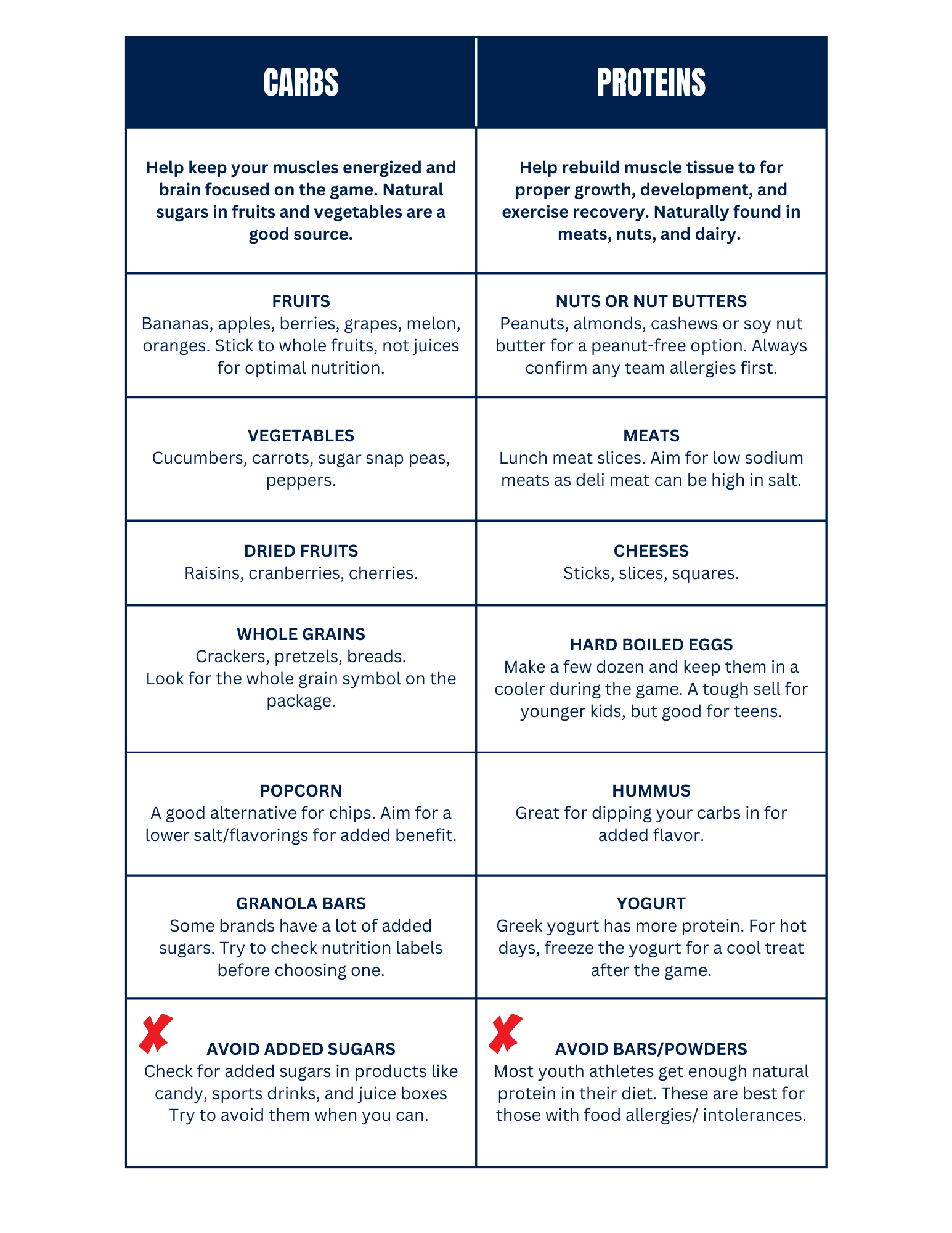How to Choose Healthy Youth Sports Snacks for Kids
Let’s talk about every kid’s favorite part of the game- the post-game snacks! Snacks are a fun part of youth sports; however, we must remember that the purpose of these snacks should be to refuel our kids with the energy and nutrients they lost while being physically active. As young athletes age, healthy snacks and nutrition become even more important for recovery. Take a look at why healthy snacks are important and tips for how to choose a healthy snack for your kids.
Why Are Healthy Snacks for Young Athletes Important?
- Proper nutrition supports muscle recovery and helps prevent injuries.
- Healthy snacks refuel your athlete’s body so it can continue to function properly.
- Proper hydration is important to replace fluids loss from sweat.
What Makes a Post-Sports Snack Healthy?
A balanced diet for kids and adults includes a balance of calories, protein, carbohydrates, and fats. Fruits, vegetables, whole grains, and lean proteins are important parts of a youth athlete’s diet and great for snacks. Kids and adults alike should try to stay away from processed foods as much as possible. It’s easy and cheaper to pick up the variety pack of chips, but try to purchase fruit, vegetables, and whole grains when you can to avoid what’s labeled as “added sugars.” The less added sugars the better.
What are Added Sugars?
Most of us have heard this phrase whether we realize it or not. Processed foods take out the important nutrients that come naturally in foods, and typically replace them with added sugars and other chemically engineered ingredients that aren’t as healthy and nutrient friendly as fresh ingredients.
For example, drinking apple juice is much different than eating an apple. When apple juice is made, the fiber is taken out of the apple. Fiber is important as it helps slow the absorption of the sugars. Without the fiber, your body absorbs both the natural and extra added sugars immediately. If your body becomes used to quick absorbing sugars, it can lead to metabolic issues down the road as you age. Instead, opt to eat the apple itself. This gives you more fiber, natural sugars, and less engineered taste and unnatural additives.
Don’t Forget Hydration When it Comes to Youth Sports Snacks
Added sugar can also sneak into post-game hydration if you’re not careful. Being adequately hydrated is important for kidneys, skin, muscles, and most other organs in the body. After all, our bodies are made of about 60% water.
Sports drinks can be a popular option for youth athletes because they sound cool, and they taste good. However, most kids do not need sports drinks to stay hydrated. They are loaded with added sugars. The purpose of a sports drink is to replace electrolytes and sugar for high performance athletes. High performance athletes need the extra sugar because they are typically expending a lot more energy than your average adult or youth athlete. They need an abundance of this quick energy source. Most youth athletes are not performing at levels where this is necessary. Now, as they become older and play more competitively and more frequently, these may be worth adding into their diet. But until then, water is key!
What Healthy Snacks Should I Bring to a Game or for Post-Game Snacks?
When choosing post-game snacks try to combine both natural carbs for quick energy and protein for muscle recovery. Examples include:
- Sandwiches, especially some that have a bit of meat for protein, bread for carbs, and cheese for healthy fats
- Fruits like sliced apples and oranges
- Veggie Slices
- Yogurt
- Peanut Butter (if approved, remember many kids have nut allergies so always check)
- Hummus
Check out the list below for more great snack ideas!
